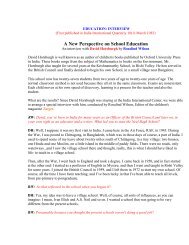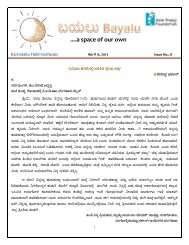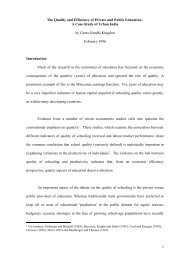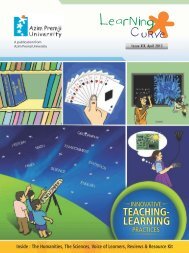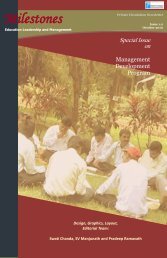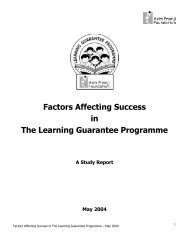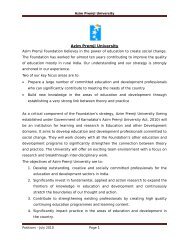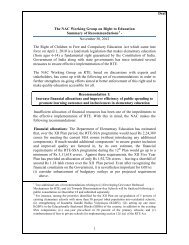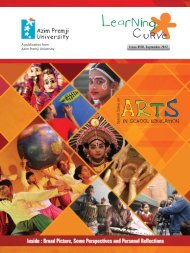Indesign Pagesnew.indd - Azim Premji Foundation
Indesign Pagesnew.indd - Azim Premji Foundation
Indesign Pagesnew.indd - Azim Premji Foundation
You also want an ePaper? Increase the reach of your titles
YUMPU automatically turns print PDFs into web optimized ePapers that Google loves.
esponsibility to instill and foster the right values among<br />
their pupils. It is not clear, though, as to how exactly they<br />
are to do this, whether they should do it separately from the<br />
description and analysis of social facts or as an integral part<br />
of that process. To build a particular set of moral values into<br />
the description and analysis of society, polity and economy<br />
is a very diffi cult undertaking whose pitfalls should not be<br />
taken lightly. I referred earlier to disagreement in the social<br />
sciences about fundamental matters relating to concepts,<br />
methods and theories. It is over what should be regarded as<br />
the best values that this disagreement is likely to be most<br />
acute.<br />
There are, of course, certain basic values embodied in the<br />
Constitution of India. The nature and signifi cance of those<br />
values should be explained to all students and they should<br />
be encouraged by their teachers to adopt them. But the<br />
Constitution sets down its basic values in very broad and<br />
general terms. It is when we come to details and specifi cs<br />
that the real disagreements come to the surface. As they<br />
say, the devil is in the detail.<br />
Should we strive to elaborate one single set of values within<br />
the framework of the Constitution for the education of all<br />
school students throughout the country? I am not at all sure<br />
as to how far we can or should go in that direction without<br />
violating the basic principle of liberal democracy which is<br />
the tolerance of a diversity of values, including a diversity of<br />
conceptions of the good society. If there is one thing that<br />
we ought to be proud of and cherish in the Indian tradition is<br />
its tolerance of the diversity of ways of life among the people<br />
of the country. Our zeal for the promotion of ‘value-based<br />
Section A<br />
Social Science in Schools<br />
education’ through the social sciences should not undermine<br />
that spirit.<br />
The point about diversity of social practices and social<br />
values ought to be emphasized - when we speak of Indian<br />
society as a whole. India is a vast society with a multitude of<br />
languages, religions, tribes, castes, sects, associations and<br />
parties. To promote a single set of values or to advocate<br />
a single conception of the good society without offending<br />
the sentiments of one or another section of this vast and<br />
complex society is a diffi cult undertaking which few can<br />
accomplish effectively and tactfully.<br />
I come back in the end to the observation with which I<br />
began: the contribution of social science teaching to the<br />
education for citizenship. Educating school students for<br />
citizenship requires fi rst of all encouraging them to think<br />
clearly, systematically and objectively about the social<br />
as well as the natural world. Beyond that, in the social<br />
sciences, it is important to give them some knowledge and<br />
understanding about the varieties of economic, political and<br />
social arrangements in such a way that the description and<br />
analysis of facts is not subordinated to the preferences and<br />
prejudices of zealous teachers and writers of text-books.<br />
Finally, if we believe that diversity is our greatest treasure,<br />
we must encourage our students to take a serious interest<br />
in this diversity and to value it. Here the most signifi cant<br />
contribution of the social sciences to the education for<br />
citizenship will be to encourage our students to cultivate<br />
an enquiring attitude towards their own ways of life and a<br />
tolerant one towards other ways of life.<br />
André Béteille is Professor Emeritus of Sociology in the University of Delhi and a National Research Professor. He<br />
has lectured in many universities and his books and papers have been published both in India and abroad. He is<br />
a Corresponding Fellow of the British Academy and an Honorary Fellow of the Royal Anthropological Institute. In<br />
2005 he was conferred Padma Bhushan by the President of India.<br />
Professor Béteille has held a number of visiting academic appointments. He was Simon Fellow at the University<br />
of Manchester, Commonwealth Visiting Professor at the University of Cambridge, Visiting Professor at the London<br />
School of Economics, Distinguished Visiting Lecturer at the University of California at Berkeley, Fellow at the<br />
Institute of Advanced Study, Berlin and Visiting Fellow at the Institute for Advanced Study in the Humanities,<br />
Edinburgh. He may be contacted at andrebeteille@yahoo.co.in<br />
Pg No: 9



